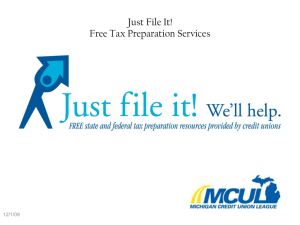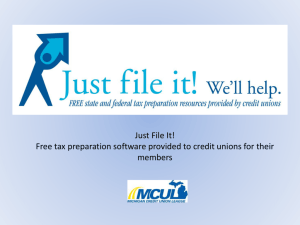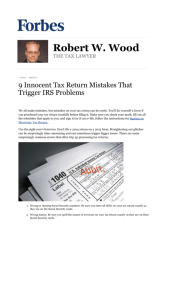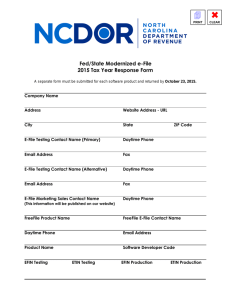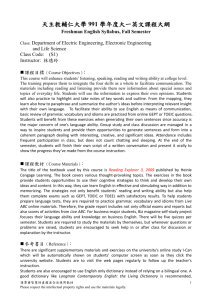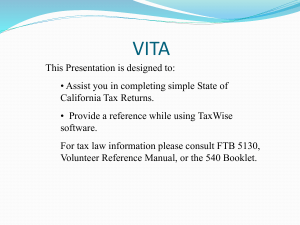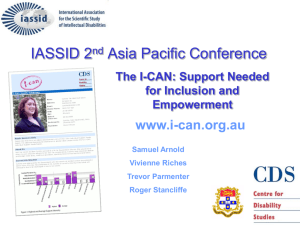Just file it! We'll help
advertisement
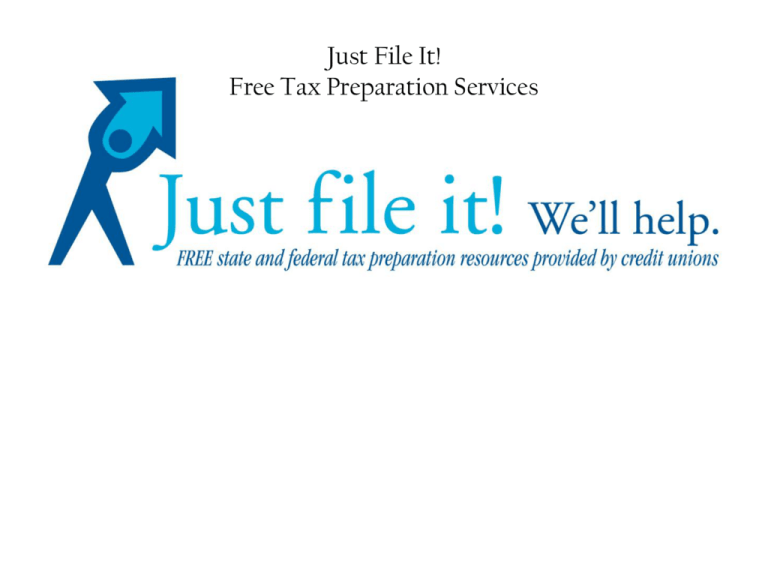
Just File It! Free Tax Preparation Services I-CAN! E-FILE It’s free! www.icanefile.org I-CAN! E-File was created by the Legal Aid Society of Orange County (California) to help individuals complete their federal tax forms and claim EITC without being charged excessive fees. (No special software is needed. Just need Adobe Reader.) – How does it work? • A credit union member goes to the homepage for their credit union and clicks on the Just file it! We’ll help. icon, this takes them directly to the I-CAN! E-File site. • Taxpayers can access I-CAN! E-File via the Internet from their home, a library, a partner site or any other location with an Internet connection. • Taxpayers go through a series of secure web pages and input answers to simple, interactive questions. • Once all of the questions have been answered, the information is compiled and placed on federal and/or state tax forms that can be e-filed or printed and mailed in. Using I-CAN! E-FILE – Launch Date : January 20, 2009 – Go to www.icanefile.org and use the Online Training demo Some I-CAN! E-File limitations • Can’t use I-CAN! E-File if: – – – – – Own business Are a church employee or clergy member Sold Real Estate in the tax year You or your employer have a non – US address Individuals with disabilities or in the military may be eligible for tax credits not included in I-CAN! E-File. A small number of people should not use I-CAN! E-File: Persons who are Blind because there are complicated credits this person may be eligible for and I-CAN! E-File cannot complete these forms; Employees whose employer contributes to child care costs; and Self- Employed individuals if they want to amortize equipment or itemize deductions What tax information is needed to file? • Your Social Security number • Your spouse’s and children’s names as they appear on the Social Security card and their Social Security numbers • All forms that show the income you received in the past year. These may include: – – – – All W-2s from employment for you, your spouse and your children Bank statements which show interest earned on deposits 1098Ts which list educational expenses Your unemployment statements • Child care information such as: – Name, phone number and address of child care facility or individual – Amount paid during the year for child care – Federal taxpayer identification number or Social Security number of facility or individual – Whether or not your employer pays part of the child care Steps in the filing process • First, you will create an account with your Name and Social Security Number. Next, you will answer questions for your federal and then state, return. Then you will print and review your return to make sure it is complete and correct. Once you are satisfied you can mail or e-file your return. If you e-file your e-file status will then be "Pending". • The next step if you e-file is to come back to www.icanefile.org in 2-3 days and click on "Check My E-file Status" on the right. If your status is "Rejected", the I-CAN! E-file status page will tell you what to do to correct your return. You may be able to e-file again or you may need to mail your return. Once your status is "Accepted", your tax return will be filed with the IRS and your state. At this point, if you are due a refund, you can click the links on the right sidebar under "Where's my refund?" to track your federal and/or state refund. • YOUR TAX RETURN IS NOT FILED UNTIL YOUR E-FILE STATUS IS "ACCEPTED". • If your status is "pending" or "rejected" that means that you have not yet filed your return according to the IRS. If you choose not to e-file you can print your forms and mail them. Forms that I-CAN! E-File can complete Federal Forms Form 1040 Schedule C Profit or Loss from Business (Profit only, 1099-MISC box 7 only) Schedule R Credit for the Elderly or the Disabled Schedule SE Self-employment tax Form 2441 Child and Dependent Care Form 8814 Parents' Election to Report Child's Interest and Dividends (For a child under 14 who gets Alaska Permanent Fund Dividends only) Schedule EIC Earned Income Credit: Qualifying Child Information Form 8812 Additional Child Tax Credit Form 8863 Education Credits Form 8901 Information on Qualifying Children Who Are Not Dependents (For Child Tax Credit) Form 8880 Credit for Qualified Retirement Savings Contributions Form 6251 Alternative Minimum Tax Schedule A&B Itemized deductions, interest and ordinary dividends Form 8888 Direct deposit into multiple accounts Form 1040v Payment voucher Federal Worksheets Pensions and Annuities Simplified Method Worksheet Social Security Benefits Worksheet IRA Deduction Worksheet Student Loan Interest Worksheet Standard Deduction Worksheet for Dependents Child Tax Credit Worksheet EIC Worksheet A or B MI Forms and Worksheets MI-1040 Michigan Individual Income Tax Return MI-1040 Schedule 1 & 2 Schedule CT Michigan College Tuition and Fees Credit Use Tax Worksheet MI-1040CR Michigan Homestead Property Tax Credit Claim MI-1040CR-7 Michigan Home Heating Credit Claim Schedule W Worksheet 2 Filer eligible to be claimed as a dependent MI-1040v Payment voucher Some things to be aware of... • Please make sure you have ALL of your tax documents before you e-file. You may start entering your information into I-CAN!™ E-file before you have all of your documents and "Save and Exit" before you get to the e-file confirmation screen. • Once you e-file you cannot change your information. Once your return is accepted, you cannot e-file again. If you receive a new tax document after you e-file, you will need to amend your return and you cannot do this using I-CAN!™ E-File. E-Filing • Electronic filing is available to taxpayers using I-CAN! EFILE if those individuals have their own email account. • E-filing allows returns to be processed quickly. Projections are that these returns and credit will be deposited within 10 days. • E-filed returns are directly deposited into credit union accounts so E-filers must have the credit union routing number and their personal share or draft account number. Credits you can claim on I-CAN! E-Filed • I-CAN! E-FILE will help you complete all necessary tax forms for your Michigan and Federal tax returns and allow you to claim all other credits and deductions your are eligible for including: • • • • • • • • Child Tax Credit; Education Credit; Savers Credit; Student Loan Deductions; Child and Dependent Care Expenses Credit; Michigan Homestead Property Tax Credit; Michigan Home Heating Credit; and Public Radio and Television • And the Federal and State Earned Income Tax Credit (EITC) The Federal Earned Income Tax Credit • The Federal Earned Income Tax Credit (EITC) program was created in 1975 to provide a tax-based wage supplement to low and moderate income working families. This special tax credit helps ease the tax burden for working families and individuals and offsets some of their living expenses. – For the 2007 tax year Michigan taxpayers claimed over $2 million in EITC refunds EITC Underutilized • Many people who are eligible for the EITC do not know about it or how to claim it. • Even workers whose income is too small to pay taxes can receive a refund though the EITC • As many as 20-25% of eligible workers don’t claim the EITC Michigan EITC • Currently 22 states have EITC programs (up from 7 in 1994) • In September, 2006, Michigan Gov. Jennifer Granholm signed legislation creating a refundable Michigan EITC. – Effective for tax years beginning after 2007. – Michigan EITC – piggyback credit equal to 10% of the Federal credit in 2008 and 20% of the Federal credit after 2008. EITC Refunds In the 2007 tax year I-CAN! E-File returned over $33 million dollars to low and moderate wage earners. $11 million of which were Earned Income Tax Credit dollars. The federal EITC will provide approximately $44.7 billion in benefits to recipients in 2008 (2009 Budget of the U.S.). Eligibility for EITC • Federal – – – – – – Have Earned Income in 2008 Have a valid Social Security Number Be a U.S. citizen or Legal Permanent Resident Not Qualify as a Dependent for another taxpayer Investment Income must be less than $2,950 (if applicable) If the number of qualifying children is 0, must be 25 years or older. • Michigan – – – – – – – – Must be a Michigan taxpayer Subject to the Michigan income tax Not necessarily a resident Must be eligible for the federal EITC Must have a Social Security Number Cannot be married filing a separate return Meet income/child criteria Cannot be blocked from claiming the federal credit due to negligence or suspected fraud (I.R.C. Sec. 32(k)). 888-4-EITC-4U • On December 1, 2008 the Legal Aid Society of Orange County will launch a nationwide tollfree number for taxpayers to call and receive EITC eligibility guidelines and be connected to free tax preparation resources and service providers. 888-4-EITC-4U Amount Taxpayers Get Back! • For 2008 low income wage earners can receive: • Families with one child who earn less than $33,995 in 2008 (or less than $36, 995 for married workers) are eligible for a credit of up to $2,917; • Families with two or more children who earn less than $38,646 in 2008 (or less than $41,646 for married workers) are eligible for a credit of up to $4,824; • Workers without a qualifying child who earn less than $12,880 in 2008 (or less than $15,880 for married workers) are eligible for a credit of up to $438. • • Earned Income includes: wages, salaries and tips; net earnings from selfemployment; union strike benefits; employer – paid disability benefits; and military combat pay. Earned Income does not include: non-taxable earned income (payroll deductions for dependent care or retirement plans); public benefits (Social Security); Other taxable income such as unemployment; alimony; interest on bank accounts. Just File It! Credit Union Partners • Nearly 90 Credit Unions enrolled to participate as Just File It! Partners for the 2007 tax filing season • • • • Dow Chemical CU (171) Michigan State University FCU (95) Michigan Tech Employees FCU (102) Members Credit Union (83) – Website Link – provided a link to the I-CAN! E-FILE application using the Just file it! icon – Publicity – publicize Just file it! to your members and in your community. Tracking Your Outreach Efforts • I-CAN! E-File provides real time usage information tracked by partner. – You must have an I-CAN! E-File partner ID number – This is a number you add to the web link your program uses when you direct members to use I-CAN! E-File. – When a user completes their tax return with I-CAN! E-File, the totals of their tax dollars are added to the totals under your credit union/program name. You can see both the total number of users who completed their tax return from your referrals by clicking on the “Taxpayer Reports” link. – You can access information about your users by typing: https://secure.icanefile.org?caller=1 (substitute your partner ID number for the 1) Just file it! Website • What’s available? • Materials ready to download and use! – Posters, teller tents, newsletter articles, statement stuffers all designed to help you promote the program to members and within the community • A list of local VITA site partners – This will be up-dated once we have the new sites for the 2008 tax filing season Contact Information Gayle Rosen – Michigan Poverty Law Program gcrosen@comcast.net Martha Ninichuk Director of CU Relations, Michigan Credit Union League (800) 262-6285, ext. 445, Martha.Ninichuk@mcul.org
